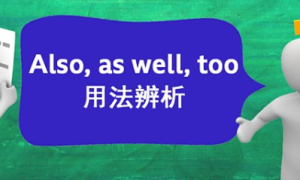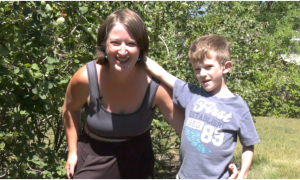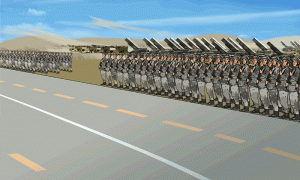much too, too much
这两个短语构成相同,顺序不同,其意思和用法的区别是:much too之后跟形容词、副词,用来加强语气; too much中的中心词是much, too在任何情况下都修饰much,之后可跟不可数名词,可单独使用,也可接of短语或代词,还可放在句尾修饰动词。例如:
The trams are much too slow.电车太慢。
There is too much noise here.这里的噪音太厉害。
We're having too much wet weather.我们这里下雨的日子太多。
We have already taken up too much of your valuable time.我们占用了你许多的宝贵时间。
The room is big, too much so for a child.这个房间对一个小孩来说太大了。
He talked too much.他讲得太多了。
too, also, as well, besides, either, moreover
这组词(组)都有“也,此外,还有”的意思。它们的区别是:
also一般用于肯定句,有强调意味,位于主谓语之间,即实义动词之前,助动词之后; too只用于肯定句中,一般位于句末,比also更口语化; either一般只用于否定句,多位于句末; as well和too一样多用于口语,放在句末; besides与moreover词义基本相同,但moreover后面所叙述的,通常比前面所叙述更为重要或更深入一步,在词序方面, moreover往往用于句首,另外, moreover是较为正式的用语。例如:
He also asked to go.他也要去。
I can also do it.我也能干那个活。
English is not easy, and French is not easy either.英语不容易,法语也不容易。
He is a teacher, and a writer as well.他是个教师,也是个作家。
I don't like those shoes; besides, they're too expensive.那双鞋我不喜欢,而且也太贵。
I don't like skating; moreover, the ice is too thin.我不想去溜冰,再说冰层也太薄。
The Opposition have consistently accused the Government of corruption.Moreover, they have named names.反对党一直在指责政府腐败,而且是指名道姓的。
too在句中的位置不同则引起句子意思的不同。试比较:
I have seen this film, too.
这部影片我也看过。
(别的影片看过,这部也看过)
I, too, have seen this film.
我也看过这部影片。
(别人看过,我也看过)
also,too,as well,either,likewise
这些词都含“也”之意。
also比too正式一些,语气较重,只用于肯定句,一般紧靠动词。
too语气较轻,多用于口语,在肯定句中使用,通常位于句末。
as well一般不用否定句,通常放在句末,强调时可放在句中。
either用于否定句,放在句末,之前加逗号。
likewise是书面语用词。
too,very
这两个副词都可表示“大,很”之意。
too指超过了承受能力或程度,即程度加到了不适当的地步。
very用于加强程度,可修饰褒义词和贬义词。










